The role of AI in business: Insights and challenges for 2025
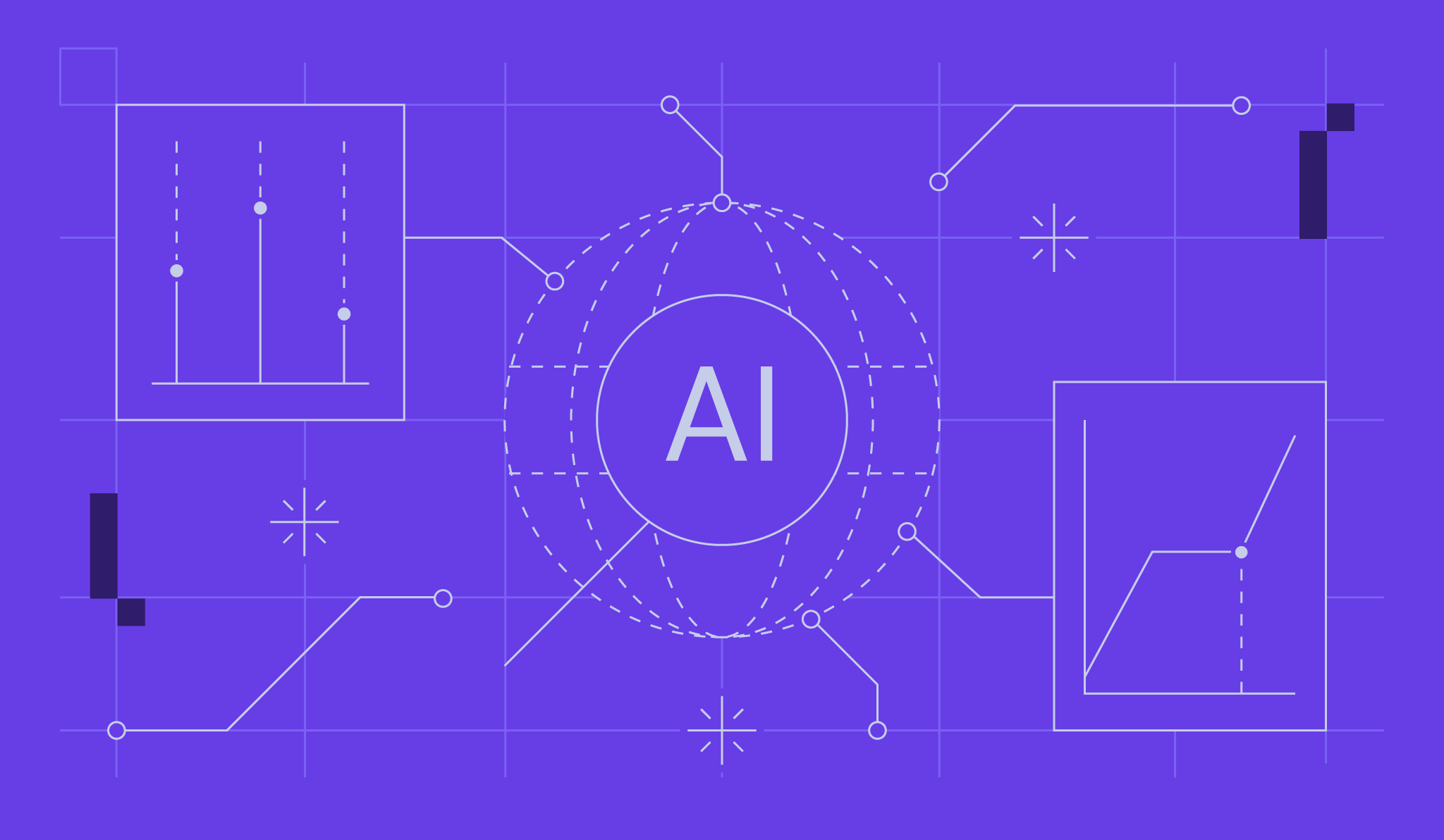
Artificial intelligence (AI) is reshaping businesses worldwide. From automating tasks to driving innovation, its impact is growing rapidly. Drawing on the data we gathered, this article uncovers fresh insights into how AI is being integrated across different sectors.
We’ll explore adoption trends, key uses, challenges, and investments in AI – plus its impact on jobs and future leadership strategies. By the end, you’ll have a clear picture of where AI stands in business today and where it’s headed.
Key takeaways from the survey
- 56% of businesses are in early or moderate adoption stages, while 20% are advanced adopters.
- Generative AI is the most widely adopted AI technology, with 51% of surveyed companies currently using it. Natural language processing (NLP) tools follow at 42%, and computer vision solutions at 26%.
- 43% of surveyed retail businesses prefer Google Gemini, 42% of healthcare lean toward Google Cloud AI, and 44% of manufacturing favor Microsoft Azure AI.
- Overall, 58% of businesses plan to increase their AI investments. Among larger organizations, that figure rises to 70%.
- 31% of businesses plan to hire for AI expertise, while 27% have already created new AI-specific roles.
- Lack of expertise is the biggest barrier, at 43%, followed by integration issues at 38%, while 29% are concerned about data privacy and security risks.
- Gen Z leaders are 428% more likely than Baby Boomers to worry about AI ethics, such as bias and discrimination.
The rising role of AI in business
AI in business refers to using advanced technologies like machine learning and automation to analyze data, make predictions, and perform tasks. AI also plays a pivotal role in improving efficiency both for businesses and individuals.
The global AI market is projected to grow by 37% annually from 2024 to 2030, and its impact on industries is already undeniable. It gives businesses a competitive edge while offering professionals opportunities to learn data analytics and machine learning skills.
AI adoption trends: where businesses stand today
Analyzing AI adoption reveals how quickly the technology is becoming mainstream and highlights opportunities for growth. Let’s examine the data.
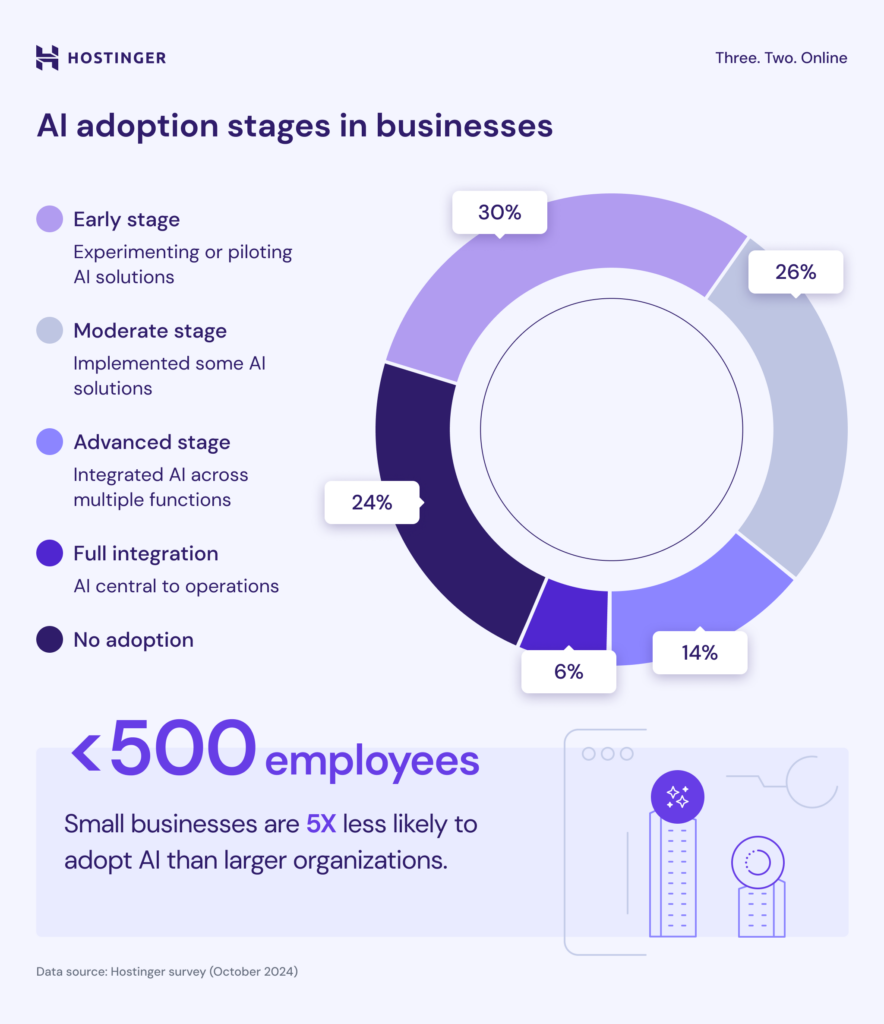
1. Over half of businesses are in the early or moderate AI adoption stages
Our survey shows that 56% of leaders say their companies are either experimenting with AI or using it in limited areas. Few have achieved advanced stages where they integrate AI widely or full integration where it powers core operations. Most businesses are still exploring how to make the most of this technology.
2. Around 24% of businesses have yet to adopt AI tools
This is often due to limited expertise, budget constraints, or uncertainty about the potential return on investment (ROI). As AI becomes increasingly essential, adopting AI tools is crucial for businesses to stay competitive.
3. One in five businesses are advanced AI adopters
20% of leaders reported full integration into their operations. These organizations often see significant benefits, such as streamlined processes, enhanced customer engagement, and reduced costs.
4. Small businesses are five times less likely to adopt AI than large organizations
Limited budgets, lack of technical expertise, and fewer resources for implementation often make it harder for them to invest in AI solutions.
In contrast, larger businesses benefit from bigger budgets, access to specialized AI teams, and the ability to scale technologies more effectively. This highlights how resource availability significantly impacts AI adoption across different business sizes.
5. IT and engineering teams dominate AI adoption
62% of IT and engineering teams are at a moderate or advanced stage of AI adoption, leading the way in this technology shift. These teams often use AI to automate IT workflows, enable predictive maintenance, and improve software development with AI-powered tools.
Top applications of AI in business
Let’s explore the top applications of AI in business. These areas showcase the most effective tools, enabling companies to improve efficiency, increase customer engagement, and build a stronger online presence.
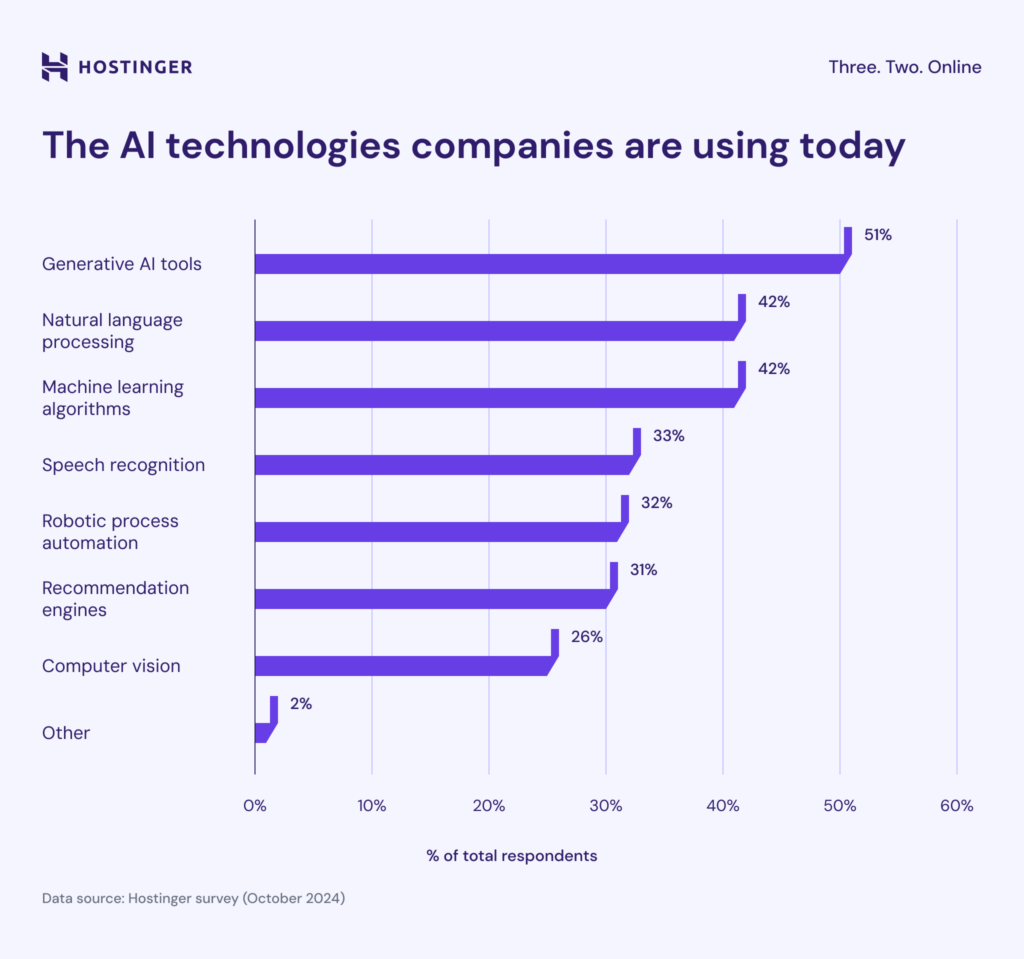
6. Generative AI remains the top choice for businesses
51% of businesses are using Generative AI to improve their operations by creating content, analyzing data, and generating realistic text, images, and more.
Generative AI’s popularity is highest among IT and engineering leaders at 74%, followed by customer service at 42% and sales teams at 38%.
7. Around 42% of businesses use NLP and machine-learning tools
About one-third also rely on speech recognition, process automation, or personalized recommendation engines.
For example, Amazon uses AI to recommend products based on customer preferences and purchase history, making the shopping experience more personalized and improving the overall customer experience.
8. One in four businesses leverage computer vision tools
Around 26% of companies use computer vision tools like facial recognition programs to improve operations across industries. Other common use cases include managing quality control automation in the manufacturing industry and identifying retail items without relying on barcode scanning.
9. Chatbots dominate AI solutions for finance and HR
Finance and HR widely use AI-powered chatbots as a solution, with 48% of leaders relying on them.
In finance, chatbots help answer customer questions, spot fraud, and simplify loan pre-qualification. In HR, they simplify hiring, guide new employees, and quickly answer common questions, saving time and effort.
10. AI tool preferences vary across industries and departments
AI tool preferences vary by industry and department, with OpenAI being the most widely used overall, especially in IT and engineering, at 53%.
Google Cloud AI leads in finance, HR, and healthcare at 42%, Google Gemini is popular in retail at 43%, and Microsoft Azure AI stands out in manufacturing at 44%.
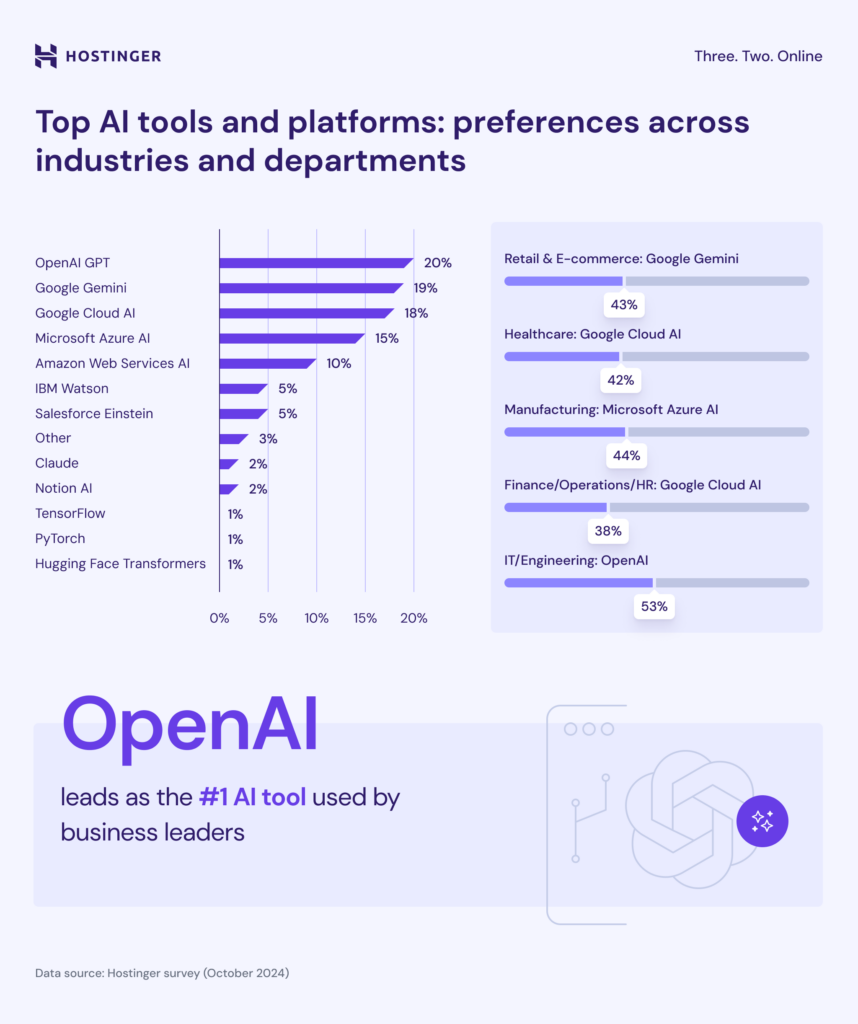
Investment trends in AI for business
AI investments are growing rapidly, showing a strong belief in its value for improving efficiency, enhancing customer service, and driving innovation. These trends highlight how businesses prioritize AI across various functions.
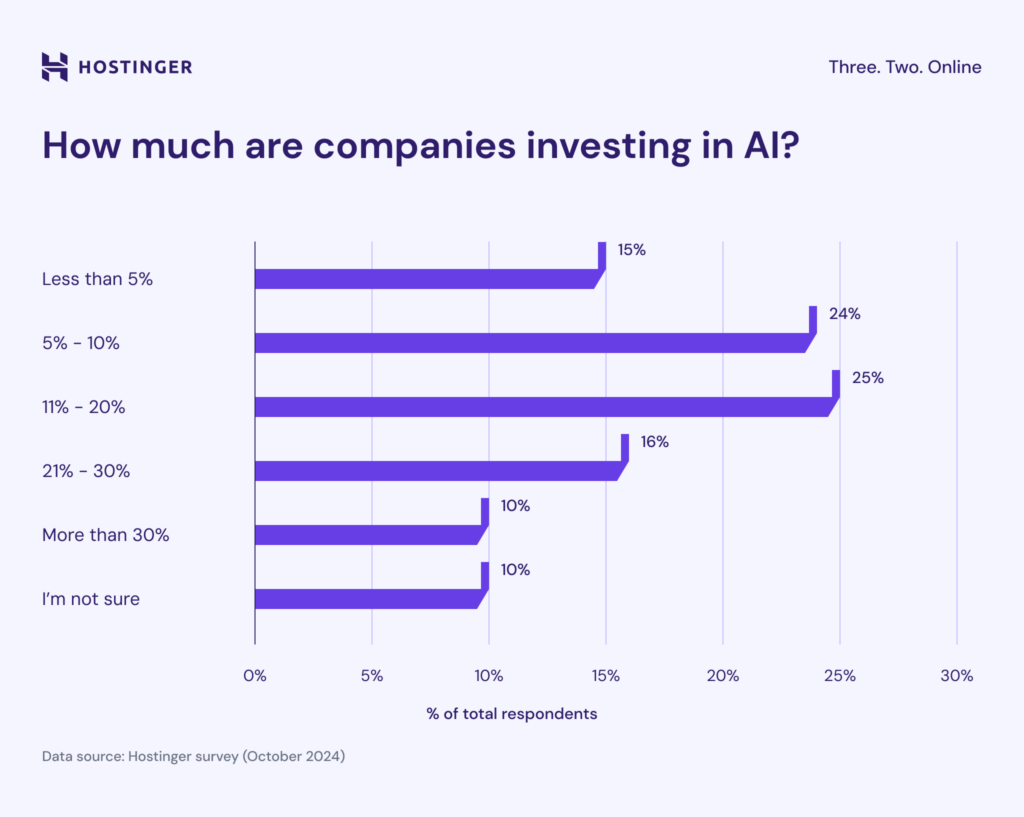
11. One in ten businesses allocate over 30% of their tech budget to AI
Around 10% of businesses dedicate more than 30% of their technology budgets to AI. This significant investment shows that AI is becoming a top priority, highlighting its role in changing how businesses work and plan for the future.
12. Nearly half of businesses dedicate 5-20% of their tech budget to AI
49% of business leaders allocate 5-20% of their technology budgets to AI, while another 26% dedicate 21-30%. The top focus areas include cybersecurity, predictive analytics, and data centers.
13. Retail and eCommerce allocate the highest AI budgets
Retail, eCommerce, and professional services lead in AI spending, with 21-30% of their tech budgets dedicated to it. In contrast, education lags behind, with most leaders reporting less than 5% allocated to AI.
This difference highlights how industries with a customer-facing focus prioritize AI to enhance personalization and streamline operations.
14. IT, engineering, and finance leaders are most likely to allocate over 30% of their tech budget to AI
IT, engineering, and finance leaders are the most likely to allocate over 30% of their tech budgets to AI, reflecting its importance in automation, decision-making, and innovation.
IT and engineering teams stand out, with 23% planning significant budget increases, compared to 13% of the general population.
Top benefits of AI adoption in business
AI adoption helps businesses boost productivity, save costs, improve customer satisfaction, and stay competitive. Let’s explore the most impactful benefits.
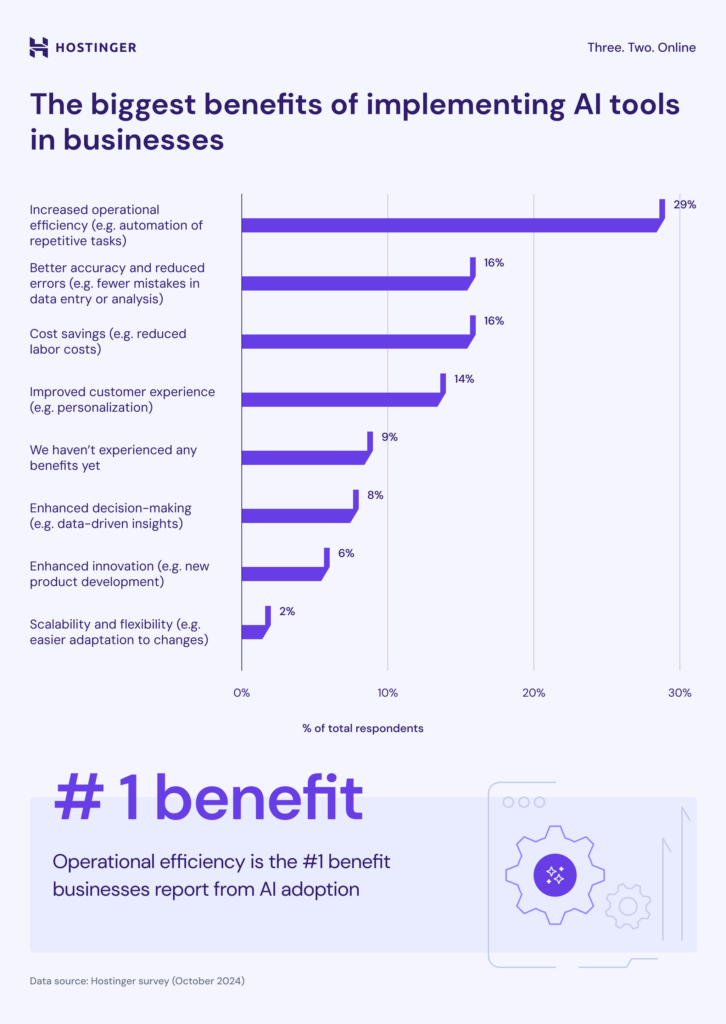
15. Operational efficiency is the top AI benefit for 29% of leaders
Nearly one-third of business leaders report that AI adoption’s biggest benefit is improved operational efficiency. AI automates tasks, streamlines workflows, and speeds up processes, helping businesses cut costs, scale operations, and focus on growth and innovation.
16. Customer service leaders value AI for improving customer experience
Customer service leaders see improved customer experience as the top AI benefit, with 23% highlighting its impact. AI enhances personalization, speeds up ticket resolution, and enables 24/7 support.
AI has been a game-changer in how we approach customer service, resolving nearly half of customer requests instantly through automation. This allows us to deliver faster, more personalized experiences to our customers while empowering our specialists to take on complex, high-value tasks. AI helps us boost customer satisfaction while empowering our team to develop advanced skills and take on strategic roles.
17. Around 31% of businesses use AI to shift employees to high-value tasks
AI frees up employee time by automating repetitive tasks and streamlining workflows. This allows teams to focus on strategic and creative work, improving productivity and morale while contributing to overall business growth.
In fact, nearly one-third of business leaders report shifting employee responsibilities to higher-value tasks after implementing AI.
18. Cost savings from efficiency are the top metric for AI ROI
AI delivers tangible financial benefits by reducing labor costs, accelerating time to market, and optimizing resource allocation. In manufacturing, for example, 17% of leaders cite improved productivity as their primary measure of AI’s value, while 14% emphasize enhanced customer satisfaction.
Challenges and concerns in AI implementation
While AI offers significant benefits, businesses face ethical concerns, data privacy issues, and the need to upskill employees to fully leverage their potential.
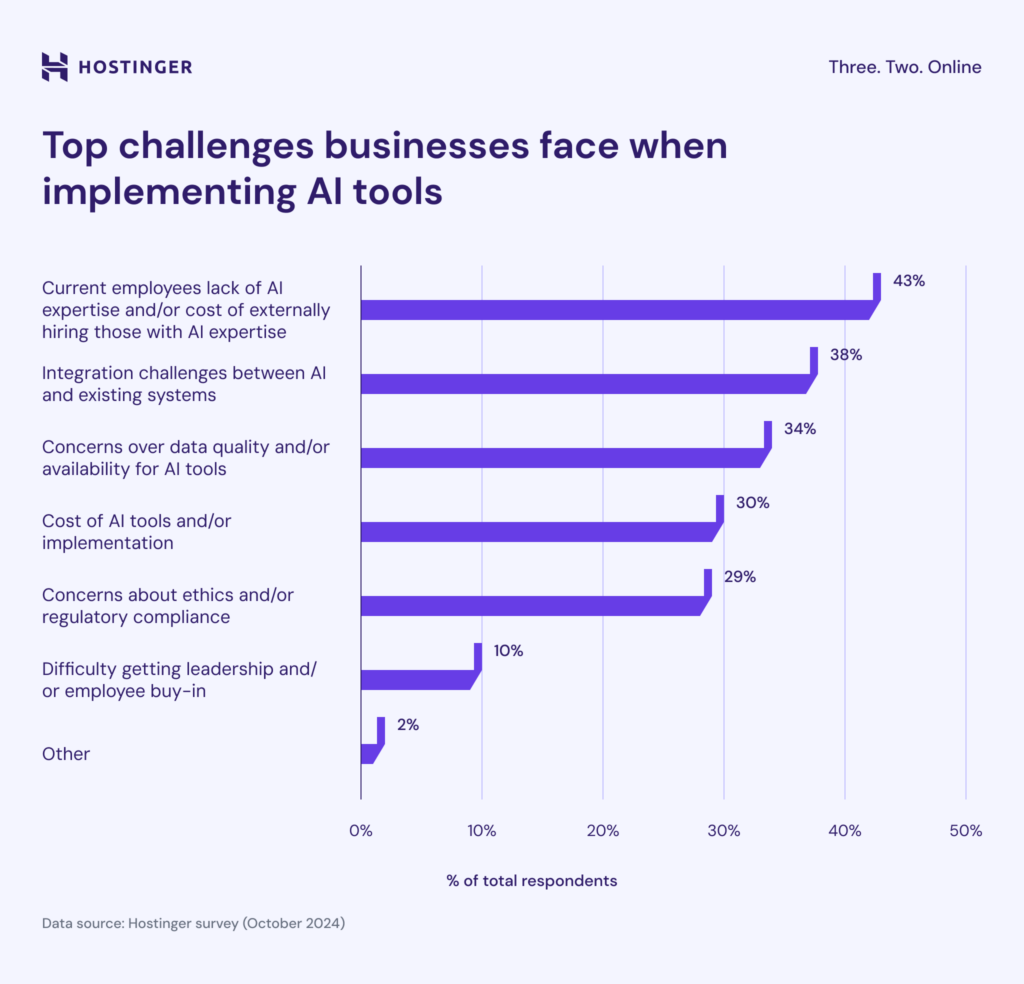
19. Expertise gaps and costs top AI challenges
43% of business leaders cite a need for more AI expertise among employees and the high cost of hiring external experts as the biggest challenges. Additionally, 34% report data quality and availability issues, hindering effective AI implementation.
With nearly half of business leaders identifying a lack of AI expertise among employees as a key barrier, workforce development has become a critical priority for successful AI adoption. The ability to upskill teams and cultivate in-house talent is essential to reducing reliance on costly external experts. Fostering continuous learning also helps employees adapt to fast-changing AI technologies. Addressing these gaps strengthens an organization’s capability to integrate AI and ensures long-term sustainability in leveraging its potential. Investing in people is the foundation for unlocking AI’s transformative impact.
20. Around 38% of leaders cite AI integration as a key challenge
38% of business leaders struggle to align AI tools with existing systems, and for IT and engineering teams, this jumps to 45%. These challenges often involve compatibility issues and resource limitations.
21. AI ethics and compliance concern nearly one-third of leaders
Around 29% of business leaders express concerns about ethics and regulatory compliance related to AI. Leaders in retail and eCommerce, at 32%, and healthcare, at 39%, are particularly worried about data privacy and security risks.
22. Expertise and integration challenges shift with AI adoption levels
The primary challenge for companies in the early to moderate stages of AI adoption is a lack of employee expertise or the high cost of hiring AI specialists, affecting 44% of businesses.
Businesses with advanced or full AI adoption face greater integration challenges, with 45% struggling to align AI tools with existing systems. This shift highlights how AI challenges evolve as businesses move from initial implementation to broader integration.
The impact of AI on jobs
AI is transforming the job market by reshaping roles, creating new opportunities, and automating repetitive tasks. While some positions are evolving, others are emerging, highlighting AI’s influence on the global job market.
23. Around 31% of businesses plan to hire for AI expertise
Nearly 31% of businesses plan to hire talent with AI expertise, reflecting the growing need for specialized skills to support AI implementation.
At the same time, 27% of leaders report reducing the need for certain roles due to AI. This shows its dual impact on workforce dynamics by creating demand for new expertise while automating repetitive tasks.
24. Around 27% of leaders create AI-specific roles or teams
Approximately 27% of business leaders have created new roles or departments dedicated to AI. IT and engineering teams are leading this shift, with 39% reporting the creation of AI-focused positions, compared to the overall average of 27%.
25. One in four businesses face major training needs due to AI
About 25% of businesses report significant upskilling and training needs due to AI adoption. This is even higher in retail and eCommerce, where 31% have invested in employee training to adapt to new tools.
26. Large firms automate more while small firms focus on training
Large organizations with over 500 employees focus on automating routine tasks, with 41% prioritizing this to free up employees for strategic work.
Smaller businesses with fewer than 500 employees, on the other hand, are more focused on upskilling and reskilling their teams, with 34% emphasizing training.
27. Healthcare organizations prioritize automation with AI
Healthcare organizations identify automating routine healthcare tasks as their top strategy to streamline admin tasks, support nurses, prevent medication errors, and lower surgery risks, with 39% opting for this approach.
AI in business over the next few years
The future of AI in business will be marked by rapid advancements, with emerging technologies shaping operations, decision-making, and customer engagement. Let’s explore how companies plan to navigate this evolving landscape.
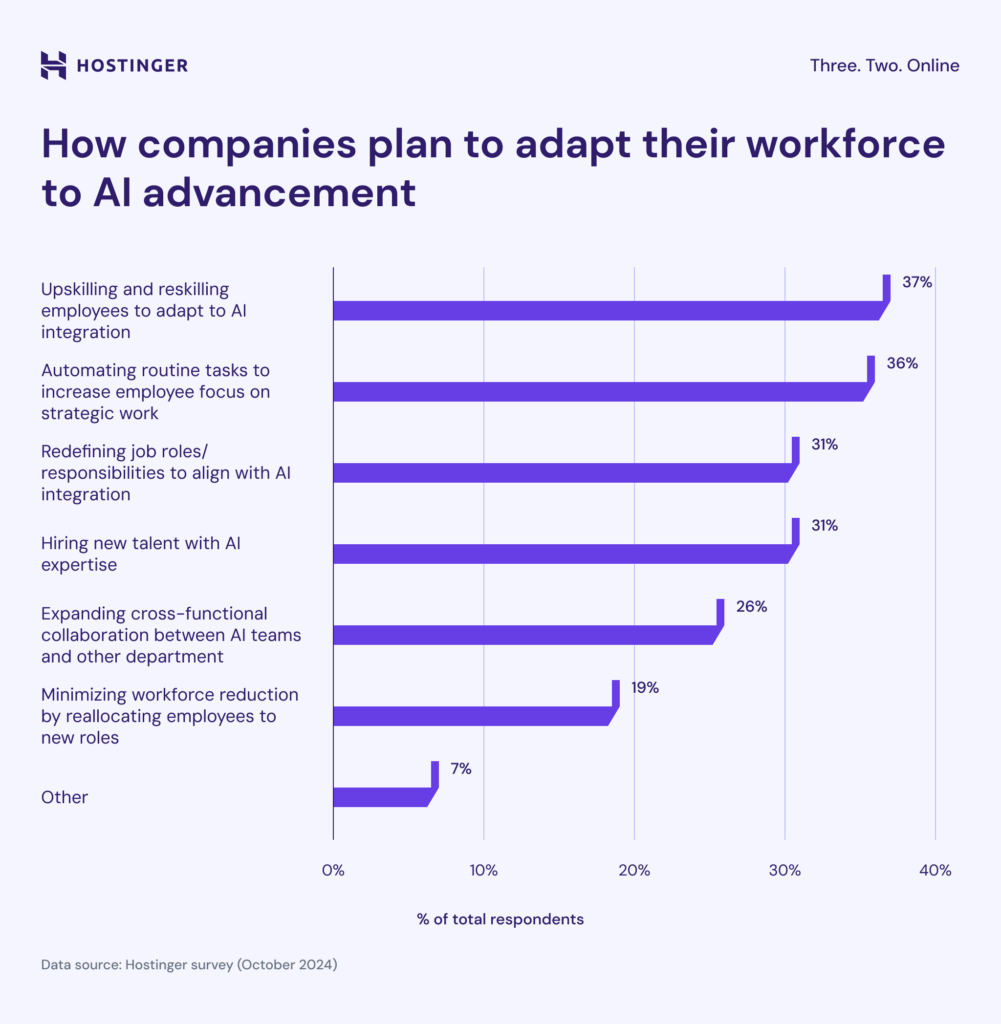
28. AI initiatives see growing investment from 58% of companies
Over 58% of businesses plan to increase their AI spending next year. Among those already using AI, 67% are in the early stages, while 85% of advanced users plan to invest even more. In contrast, 80% of companies without AI adoption have no plans to change that.
These trends reflect a strong commitment to leveraging AI for growth and innovation, particularly among businesses already benefiting from its integration.
29. Upskilling for AI is a priority for more than one-third of companies
Organizations see upskilling for AI as a way to bridge expertise gaps and align employees with business goals.
In fact, over 37% of businesses plan to upskill and reskill employees in the next 2-3 years to adapt to AI advancements. This includes building AI fluency, developing domain-specific skills, and integrating learning into workflows.
30. AI prompts 31% of businesses to realign job responsibilities
AI integration is leading 31% of businesses to redefine job roles to better align with new technologies. By automating routine tasks, AI shifts responsibilities, enabling employees to focus on strategic, creative, and decision-making roles.
31. Expanding cross-functional AI collaboration is key for 26% of companies
Around 26% of businesses plan to expand cross-functional collaboration between AI teams and other departments to maximize the impact of AI initiatives.
Larger organizations with over 500 employees are more likely to prioritize this approach, with 70% planning to increase AI investments, compared to 52% of smaller businesses.
32. Around 36% of leaders expect AI to transform operations in 2-3 years
Over one-third of business leaders see the most potential for AI in transforming operations and logistics within the next 2-3 years. Walmart offers a clear example of AI’s potential, using its AI-powered logistics technology to enhance supply chain efficiency.
The role of AI in transforming website creation for businesses
AI is revolutionizing how businesses build and manage their websites, enabling faster development, improved design, and enhanced user experiences. Let’s look at how businesses are using AI in website creation.
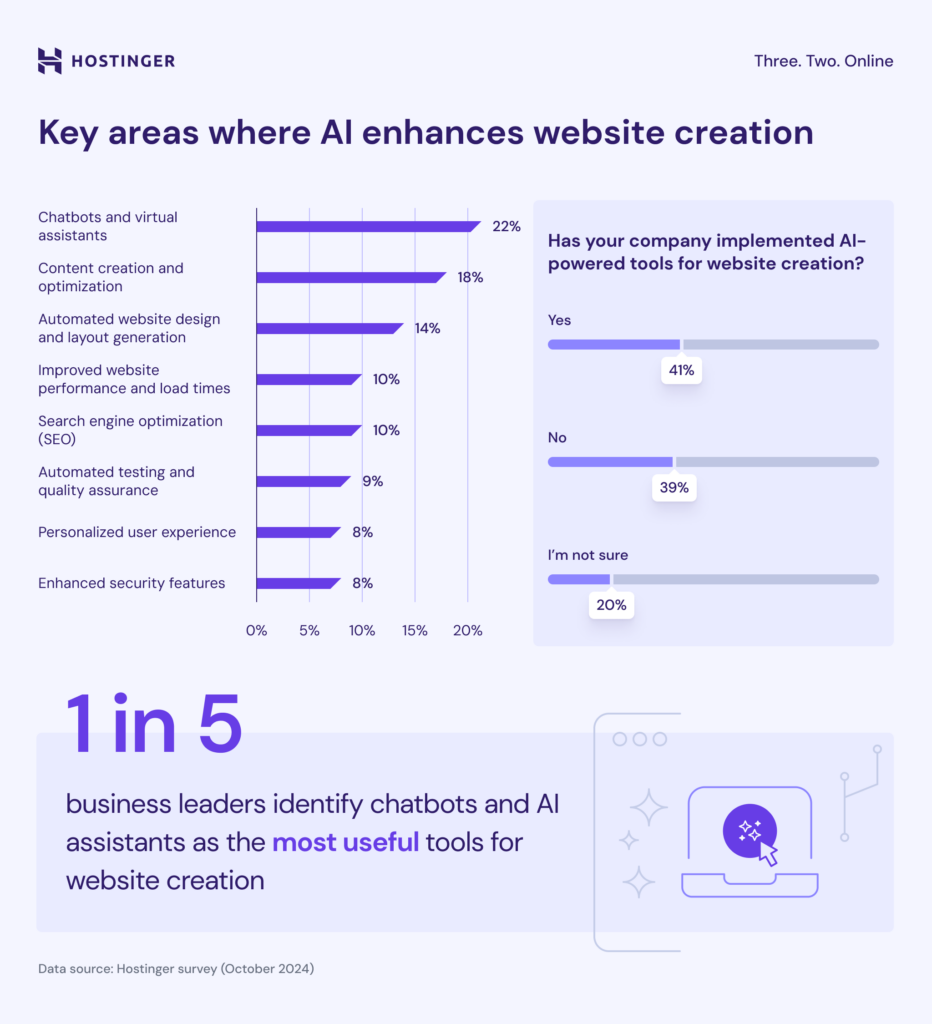
33. About 41% of businesses use AI-powered tools for website creation
Around 41% of companies use AI-powered tools such as Hostinger’s AI Website Builder to streamline website creation. These tools help you create professional websites quickly by automating design, generating content, and improving performance.
34. Retail and eCommerce companies lead in using AI for website creation
Retail and eCommerce businesses are at the forefront of AI-powered website creation, with 55% leveraging these tools compared to 41% across all industries.
AI helps eCommerce companies deliver personalized shopping experiences, optimize product discovery, and customize marketing messages. It can also help predict consumer behavior.
35. Advanced AI adopters are more likely to use AI for website creation
Businesses fully embracing AI are ahead, with 70% using AI for website creation compared to 46% of those just starting. Early adopters often use AI to create and optimize website content, with 22% finding it especially valuable.
In contrast, advanced adopters find tools like chatbots and AI assistants most helpful, with 25% emphasizing their importance.
36. Chatbots and AI assistants are seen as the most valuable tools for website creation by 1 in 5 leaders
20% of business leaders consider chatbots and AI assistants the most valuable tools for website creation. These tools enhance customer support, improve engagement, and streamline user experiences.
For example, Hostinger’s AI assistant, Kodee, helps businesses provide quick responses and seamless navigation, showcasing the power of AI in optimizing websites.
AI has been a game-changer in how we approach customer service, resolving nearly half of customer requests instantly through automation. This allows us to deliver faster, more personalized experiences to our customers while empowering our specialists to take on complex, high-value tasks. AI helps us boost customer satisfaction while empowering our team to develop advanced skills and take on strategic roles.
How leaders view AI: Confidence and key concerns
Business leaders recognize AI’s potential, but concerns remain. Data privacy and security risks are at the top of the list, with 29% of leaders worried about the challenges of safely implementing AI tools.
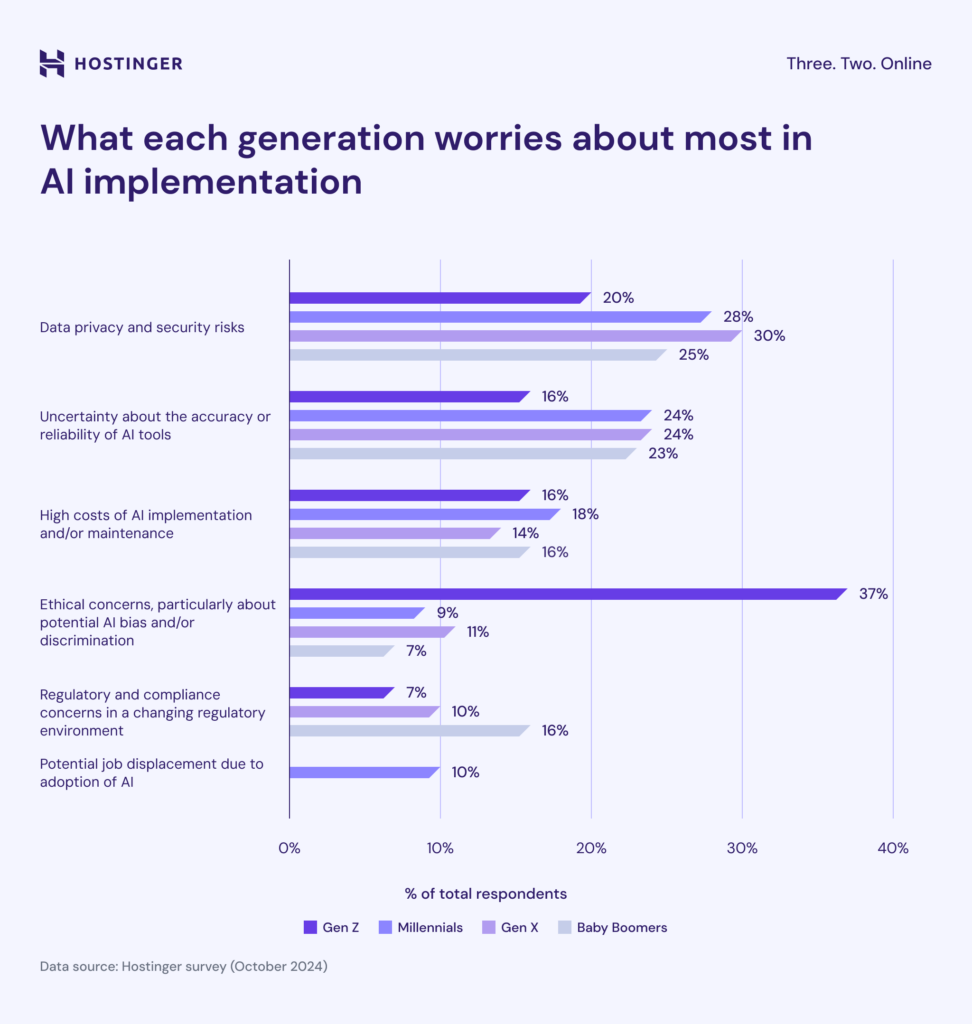
37. AI tool reliability raises concerns for 24% of leaders
Smaller businesses, at 27%, are especially cautious, as limited resources may amplify the impact of inaccurate outputs.
In contrast, larger businesses focus more on data privacy and security risks, with 32% prioritizing these concerns. These differences highlight how company size shapes priorities when adopting AI.
38. 54% of Gen Z leaders are confident in AI
While only 32% of business leaders feel very confident in their company’s ability to manage AI effectively, this jumps to 54% among Gen Z leaders. Gen Z stands out as the most confident generation, with more than half believing they can successfully handle AI tools.
39. AI bias and ethics worry 37% of Gen Z business leaders
AI bias and ethics are a concern for 37% of Gen Z business leaders. They are 428% more likely than Baby Boomers to worry about fairness and transparency in AI. This highlights the need for businesses to focus on ethical AI practices as adoption increases.
40. AI’s potential is highest in customer service and marketing for 16% of leaders
About 16% of business leaders see the most potential for AI in customer service or marketing, while 11% believe it will have the greatest impact on sales.
When breaking this down by company size, smaller businesses lean more toward marketing at 19%, whereas larger companies prioritize customer service at 21%. These differing emphases highlight how organizational scale can influence where leaders see AI delivering the most value.
Main takeaways
AI adoption helps businesses improve operations, enhance customer experiences, and streamline website creation.
While many are in the early stages, advanced adopters are leveraging tools like chatbots and AI assistants, with 58% of companies planning to increase investments.
Challenges like expertise gaps, integration issues, and ethical concerns remain. Smaller businesses focus on upskilling employees, while larger organizations prioritize automation to boost efficiency.
Looking ahead, AI’s impact will grow in operations, logistics, and customer service. By overcoming challenges and embracing AI, businesses can unlock valuable insights, reduce costs, and stay competitive.
Methodology
This study is based on an in-depth survey conducted by Datalily for Hostinger in October 2024. The survey included 1,000 professionals across the United States, representing various industries and company sizes.
Respondents included business leaders and professionals with decision-making power, such as founders, executives, researchers, consultants, and small-business owners. This diverse sample ensures reliable insights into the role of AI in business today.
Sources
AI in business FAQ
What is AI in business?
AI in business refers to using advanced technologies like machine learning and automation to analyze data, improve decision-making, and perform tasks. It helps businesses streamline operations, personalize customer experiences, and innovate efficiently.
How do companies use AI?
Companies use AI for automation, data analysis, and customer engagement. Examples include AI chatbots for support, predictive analytics for market trends, and AI-driven personalization in eCommerce to enhance shopping experiences.
What is the most common AI in business?
Generative AI tools like OpenAI are the most widely used for creating content, powering chatbots, and performing data analysis. These tools enhance efficiency, enable automation, and provide innovative solutions across industries.
How will AI transform businesses?
AI will transform businesses by automating routine tasks, enhancing data analysis, and improving decision-making. It enables machine learning algorithms to gather intelligence, strengthen cybersecurity, and drive innovation.







